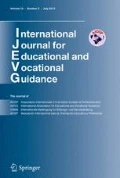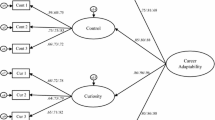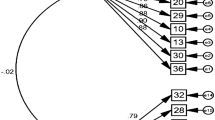Abstract
The protean career orientation is descriptive of workers who show self-directedness and values-driven behaviors toward professional advancement. Such characteristics have been highly demanded from professionals in the past decades, evidencing their identification and development relevance. Considering that identifying construct structure and invariance is critical for effective measurement and both theory-building and practice, this study aimed to adapt and obtain internal and external validity evidence of the Protean Career Measure to the Brazilian context. Participants were 558 professionals (67% women). Exploratory and confirmatory factor analyses resulted in a unidimensional model. They provided evidence of configural, metric, and scalar invariance between men and women. Also, they showed convergence between the protean career orientation and career models based on other characteristics (kaleidoscope, adaptability, and work engagement). Finally, results showed that the protean orientation tends to be higher, according to the participants’ life/career stages’ advancement. We discuss the application for research and interventions.

Similar content being viewed by others
References
Ambiel, R. A. M. (2014). Adaptabilidade de carreira: uma abordagem histórica de conceitos, modelos e teorias. Revista Brasileira de Orientação Profissional, 15(1), 15–24.
Audibert, A., & Teixeira, M. A. P. (2015). Escala de Adaptabilidade de Carreira: evidências de validade em universitários brasileiros. Revista Brasileira de Orientação Profissional, 16(1), 83–93.
Bandeira, P. B., De Andrade, A. L., & Oliveira, M. Z. (2019). Adaptação e evidências de validade da Escala de Parâmetros da Carreira Caleidoscópica. Revista Brasileira de Orientação Profissional, 20(1), 103–114.
Baruch, Y. (2014). The development and validation of a measure for protean career orientation. International Journal of Human Resource Management, 25, 2702–2723. https://doi.org/10.1080/09585192.2014.896389
Baruch, Y., Szűcs, N., & Gunz, H. (2015). Career studies in search of theory: The rise and rise of concepts. Career Development International, 20(1), 3–20. https://doi.org/10.1108/CDI-11-2013-0137
Borges, L. L. F., De Andrade, A. L., de Oliveira, M. Z., & Guerra, V. M. (2015). Expanding and adapting the Protean Career Management Scale for university students (PCMS-U). The Spanish Journal of Psychology, 18, E103. https://doi.org/10.1017/sjp.2015.83
Borsa, J. C., Damásio, B. F., & Bandeira, D. R. (2012). Adaptação e validação de instrumentos psicológicos entre culturas: algumas considerações. Paideia, 22(53), 423–432. https://doi.org/10.1590/1982-43272253201314
Briscoe, J. P., Hall, D. T., & Frautschy DeMuth, R. L. (2006). Protean and boundaryless careers: An empirical exploration. Journal of Vocational Behavior, 69(1), 30–47. https://doi.org/10.1016/j.jvb.2005.09.003
Brown, T. A. (2015). Confirmatory factor analysis for applied research (2nd ed.). Guilford Publications.
Byrne, B. M. (2016). Structural equation modeling with AMOS: Basic concepts, applications, and programming (3rd ed.). Routledge.
Chan, K. Y., Ho, M. R., Chernyshenko, O. S., Bedford, O., Uy, M. A., Gomulya, D., Sam, Y. L., & Phan, W. M. J. (2012). Entrepreneurship, professionalism, leadership: A framework and measure for understanding boundaryless careers. Journal of Vocational Behavior, 81(1), 73–88.
Damásio, B. F. (2013). Contribuições da análise fatorial confirmatória multigrupo (AFCMG) na avaliação de invariância de instrumentos psicométricos. Psico-USF, 18(2), 211–220.
De Andrade, A. L., Pissaia, A. T., Silva, M. Z., & de Oliveira, M. Z. (2016). Protean career features and affect in the career of Psychology students. Estudos De Psicologia (Campinas), 33(4), 677–688. https://doi.org/10.1590/1982-02752016000400011
Direnzo, M. S., Greenhaus, J. H., & Weer, C. H. (2015). Relationship between protean career orientation and work-life balance: A resource perspective. Journal of Organizational Behavior. https://doi.org/10.1002/job.1996
dos Santos Magnan, E., Amorim, M. V., Machado, W. L., & Oliveira, M. Z. (2020). Desenho do trabalho, atitudes de carreira e saúde mental em empresas de tecnologia da informação. Revista Psicologia Organizações e Trabalho, 20(2), 1018–1024. https://doi.org/10.17652/rpot/2020.2.18166
Farina, L. S. A., Rodrigues, G. D. R., Fagundes, N. K., Carafini, T. C., Moreira, L. G. C. S., Machado, W. D. L., & Hutz, C. S. (2019). Flow e engajamento no trabalho: associações com recursos individuais e contexto laboral. Revista Avaliação Psicológica, 18(04), 362–371. https://doi.org/10.15689/ap.2019.1804.18813.04
Farsen, T. C., Fiorini, M. C., & Bardagi, M. P. (2017). Análises psicométricas de instrumentos validados em diversos contextos: o caso da Escala de Adaptabilidade de Carreira. Gerais: Revista Interinstitucional de Psicologia, 10(2), 162–175.
Ferrando, P. J., & Lorenzo-Seva, U. (2017). Program FACTOR at 10: Origins, development and future directions. Psicothema, 29(2), 236–241. https://doi.org/10.7334/psicothema2016.304
Gubler, M., Arnold, J., & Coombs, C. (2014). Reassessing the protean career concept: Empirical findings, conceptual components, and measurement. Journal of Organizational Behavior, 35(S1), S23–S40. https://doi.org/10.1002/job.1908
Hall, D. T. (1996). Protean careers of the 21st century. The Academy of Management Executive, 10, 8–16. https://doi.org/10.2307/4165349
Hall, D. T. (2004). The protean career: A quarter-century journey. Journal of Vocational Behavior, 65(1), 1–13. https://doi.org/10.1016/j.jvb.2003.10.006
Hall, D. T., Yip, J., & Doiron, K. (2018). Protean careers at work: Self-direction and values orientation in psychological success. Annual Review of Organizational Psychology and Organizational Behavior, 5(1), 129–156. https://doi.org/10.1146/annurev-orgpsych-032117-104631
Herrmann, A., Hirschi, A., & Baruch, Y. (2015). The protean career orientation as a predictor of career outcomes: Evaluation of incremental validity and mediation effects. Journal of Vocational Behavior, 88, 205–214. https://doi.org/10.1016/j.jvb.2015.03.008
Holtschlag, C., Masuda, A. D., Reiche, B. S., & Morales, C. (2020). Why do millennials stay in their jobs? The roles of protean career orientation, goal progress and organizational career management. Journal of Vocational Behavior, 118, 103366. https://doi.org/10.1016/j.jvb.2019.103366
IBGE. (2021). Brazilian Institute of Geography and Statistics. Retrieved from https://www.ibge.gov.br/
International Labour Organization [ILO]. (2017). World employment and social outlook: Trends 2017. International Labour Organization.
ITC. (2017). The ITC guidelines for translating and adapting tests (2nd edition). Retrieved from https://www.intestcom.org/files/guideline_test_adaptation_2ed.pdf
Kemper, C. J., Trapp, S., Kathmann, N., Samuel, D. B., & Ziegler, M. (2019). Short versus long scales in clinical assessment: Exploring the trade-off between resources saved and psychometric quality lost using two measures of obsessive-compulsive symptoms. Assessment, 26(5), 767–782. https://doi.org/10.1177/1073191118810057
Lorenzo-Seva, U., Timmerman, M. E., & Kiers, H. A. L. (2011). The Hull method for selecting the number of common factors. Multivariate Behavioral Research, 46, 340–364. https://doi.org/10.1080/00273171.2011.564527
Mainiero, L. A., & Gibson, D. E. (2018). The kaleidoscope career model revisited: How midcareer men and women diverge on authenticity, balance, and challenge. Journal of Career Development, 45(4), 361–377. https://doi.org/10.1177/0894845317698223
Mainiero, L. A., & Sullivan, S. E. (2005). Kaleidoscope careers: An alternate explanation for the “opt-out” revolution. Academy of Management Perspectives, 19(1), 106–123. https://doi.org/10.5465/AME.2005.15841962
Muthén, L. K., & Muthén, B. O. (2011). Mplus user’s guide. Author. https://doi.org/10.1111/j.1600-0447.2011.01711.x
National Household Sample Survey [NHSS]. (2021). Continuous NHSS January 2021. The Brazilian Institute of Geography and Statistics.
Oliveira, M. Z., & Gomes, W. B. (2014). Estilos reflexivos e atitudes de carreira proteana e sem fronteiras nas organizações contemporâneas brasileiras. Revista Psicologia Organizações e Trabalho, 14(1), 105–118.
Oliveira, M. Z., Zanon, C., da Silva, I. S., Pinhatti, M. M., Gomes, W. B., & Gauer, G. (2009). Avaliação do autogerenciamento e do direcionamento de carreira: estrutura fatorial da escala de atitudes de carreira proteana. Gerais: Revista Interinstitucional de Psicologia, 2, 160–169.
Oliveria, M. Z., Zanon, C., da Silva, I. S., Pinhatti, M. M., Gomes, W. B., & Gauer, G. (2010). Validação da versão brasileira da escala de atitudes de carreira sem-fronteiras. Arquivos Brasileiros de Psicologia, 62(3), 106–114.
Ribeiro, M. A. (2017). Understanding career resilience and career adaptability in challenging and vulnerable contexts. In K. Maree (Ed.), Psychology of career adaptability, employability and resilience (pp. 397–414). Springer.
Ribeiro, M. A. (2020). Contribuições da psicologia para repensar o conceito de trabalho decente. Revista Psicologia Organizações e Trabalho, 20(3), 1114–1121. https://doi.org/10.17652/rpot/2020.3.19488
Savickas, M. L., & Porfeli, E. J. (2012). Career Adapt-Abilities Scale: Construction, reliability, and measurement equivalence across 13 countries. Journal of Vocational Behavior, 80(3), 661–673. https://doi.org/10.1016/j.jvb.2012.01.011
Schaufeli, W. B. (2012). Work engagement: What do we know and where do we go? Romanian Journal of Applied Psychology, 14(1), 3–10.
Silva, M. Z., & De Andrade, A. L. (2019). Influência da carreira e do capital psicológico em aspectos de vida e trabalho. Psico-USF, 24(1), 55–67. https://doi.org/10.1590/1413-82712019240105
Siqueira, M. M. M., Martins, M. C. F., Orengo, V., & Souza, W. S. (2014). Engajamento no trabalho. In M. M. M. Siqueira (Ed.), Novas medidas do comportamento organizacional: ferramentas de diagnóstico e de gestão (pp. 147–156). Artmed Editora.
Steiner, R. S., Hirschi, A., & Wang, M. (2019). Predictors of a protean career orientation and vocational training enrollment in the post-school transition. Journal of Vocational Behavior, 112, 216–228. https://doi.org/10.1016/j.jvb.2019.03.002
Sullivan, S. E., & Baruch, Y. (2009). Advances in career theory and research: A critical review and agenda for future exploration. Journal of Management, 35(6), 1542–1571. https://doi.org/10.1177/0149206309350082
Sullivan, S. E., Forret, M. L., Carraher, S. M., & Mainiero, L. A. (2009). Using the kaleidoscope career model to examine generational differences in work attitudes. Career Development International, 14(3), 284–302. https://doi.org/10.1108/13620430910966442
Trizano-Hermosilla, I., & Alvarado, J. M. (2016). Best alternatives to Cronbach’s alpha reliability in realistic conditions: Congeneric and asymmetrical measurements. Frontiers in Psychology, 7, 1–8. https://doi.org/10.3389/fpsyg.2016.00769
Wachelke, J., Natividade, J., Andrade, A., Wolter, R., & Camargo, B. (2014). Caracterização e avaliação de um procedimento de coleta de dados online (CORP). Avaliação Psicológica, 13(1), 143–146.
Waters, L., Briscoe, J. P., Hall, D. T., & Wang, L. (2014). Protean career attitudes during unemployment and reemployment: A longitudinal perspective. Journal of Vocational Behavior, 84(3), 405–419. https://doi.org/10.1016/J.JVB.2014.03.003
Wiernik, B. M., & Kostal, J. W. (2019). Protean and boundaryless career orientations: A critical review and meta-analysis. Journal of Counseling Psychology, 66(3), 280–307. https://doi.org/10.1037/cou0000324
Funding
This study was supported by Cnpq (National Council for Scientific and Technological) [Grant No. 308323/2018-1], FAPES (Espírito Santo Research Foundation) [Grant No. 226/2019].
Author information
Authors and Affiliations
Corresponding author
Additional information
Publisher's Note
Springer Nature remains neutral with regard to jurisdictional claims in published maps and institutional affiliations.
Rights and permissions
About this article
Cite this article
De Andrade, A.L., Teixeira, M.A.P.T. & de Oliveira, M.Z. The Brazilian Portuguese adaptation of Protean Career Orientation Scale: invariance, correlates, and life/career stages. Int J Educ Vocat Guidance 23, 615–633 (2023). https://doi.org/10.1007/s10775-022-09539-x
Received:
Accepted:
Published:
Issue Date:
DOI: https://doi.org/10.1007/s10775-022-09539-x




